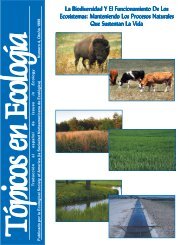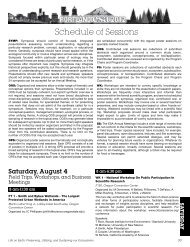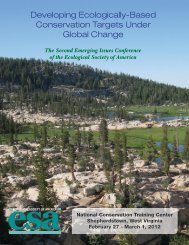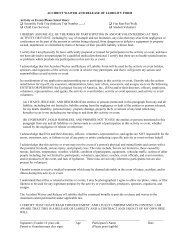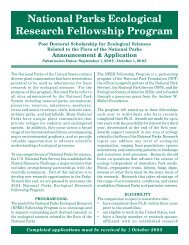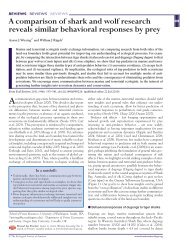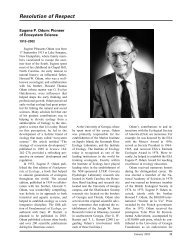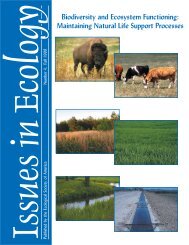Printed Program (PDF) - Ecological Society of America
Printed Program (PDF) - Ecological Society of America
Printed Program (PDF) - Ecological Society of America
You also want an ePaper? Increase the reach of your titles
YUMPU automatically turns print PDFs into web optimized ePapers that Google loves.
11: am-1:15 pm; 1:30 pm-5 pm<br />
WK 25 - Considerations for Data Aquisition Systems<br />
F150, Oregon Convention Center<br />
Organized by: DV Baker (dbaker@campbellsci.com)<br />
We will discuss various sensor types, how they work, and<br />
considerations in selecting and deploying a sensor. Data logging,<br />
power, and communications options for a custom data acquisition<br />
system will also be discussed. The workshop will conclude<br />
with demonstrations and (depending on attendance) hands on<br />
experience.<br />
WK 27 - Social Media for Collaboration, Outreach and<br />
Impact<br />
F151, Oregon Convention Center<br />
Organized by: S Chung, JL Gill<br />
The rapid growth <strong>of</strong> social media tools and online communities<br />
dovetails neatly with increasing need for effective collaboration and<br />
outreach in science. This session includes case studies, live demos<br />
and best practices for the strategic use <strong>of</strong> social media and other online<br />
tools to improve scientific collaboration, education and outreach.<br />
12 pm-1 pm<br />
ESA Long-term Studies Section Business Meeting<br />
Morrison, Doubletree Hotel<br />
ESA Southwest Chapter Brown Bag Lunch<br />
Ross Island, Doubletree Hotel<br />
1:30 pm-5 pm<br />
SYMP 1 - Frontiers In Measuring and Projecting Long-<br />
Lived Vegetation Dynamics<br />
Portland Blrm 251, Oregon Convention Center<br />
Organized by: OL Loucks (loucksol@muohio.edu), SB Franklin<br />
Endorsed by: Vegetation Section, Vegetation Classification Panel,<br />
Long-term Studies Section<br />
Moderator: OL Loucks<br />
Scholars confront a wide variety <strong>of</strong> data showing change in vegetation<br />
due to a mixture <strong>of</strong> causes. Such natural and human-dominated<br />
processes induce both slow and rapid changes in vegetation, and<br />
these research results present an important challenge to the central<br />
assumption <strong>of</strong> vegetation classification and inventory.<br />
1:30 PM<br />
1:35 PM<br />
Introductory remarks<br />
SYMP 1-1 Neilson, RP<br />
Life on Earth: Preserving, Utilizing, and Sustaining our Ecosystems<br />
41<br />
1 and SW Running2 3:50 PM SYMP 1-6 Harrison, SP<br />
, (1)<br />
Oregon State University (Courtesy), (2)University <strong>of</strong><br />
Montana. Where do we think the global vegetation is<br />
going next?.<br />
2:00 PM SYMP 1-2<br />
University <strong>of</strong><br />
Johnson,<br />
Calgary.<br />
EA and<br />
Describing<br />
ST<br />
or<br />
Michaletz,<br />
explaining:<br />
Understanding effects <strong>of</strong> disturbance processes on<br />
ecological processes.<br />
2:25 PM SYMP 1-3 Palmquist, KA, RK Peet, JM White and K<br />
Israel, University <strong>of</strong> North Carolina at Chapel Hill. Longterm<br />
vegetation change in contrasting North Carolina<br />
ecosystems.<br />
2:50 PM SYMP 1-4 Canham, CD, Cary Institute <strong>of</strong><br />
Ecosystem Studies. Disentagling responses to climate<br />
change versus broad anthropogenic impacts in<br />
temperate forests.<br />
3:15 PM Break<br />
3:25 PM SYMP 1-5 Zedler, JB, University <strong>of</strong> Wisconsin-<br />
Madison. Competitive advantage <strong>of</strong> invasive clonal<br />
plants in changing wetlands.<br />
1 , EI Damschen2 , A<br />
Eskelinen3 and BM Going3 4:15 PM<br />
, (1)University <strong>of</strong> California -<br />
Davis, (2)University <strong>of</strong> Wisconsin-Madison, (3)University<br />
<strong>of</strong> California, Davis. Using functional traits to predict and<br />
compare change among plant communities.<br />
SYMP 1-7 Waller, DM1 , SE Johnson2 , G Sonnier3 and DA Rogers4 , (1)University <strong>of</strong> Wisconsin, (2)<br />
Northland College, (3)University <strong>of</strong> Wisconsin-Madison,<br />
(4)University <strong>of</strong> Wisconsin - Parkside. Characterizing<br />
plant functional trait pr<strong>of</strong>iles to infer drivers <strong>of</strong> ecological<br />
change in Wisconsin forest plant communities.<br />
4:40 PM Discussion<br />
SYMP 2 - Interacting with Practitioners to Facilitate<br />
Earth Stewardship<br />
Portland Blrm 252, Oregon Convention Center<br />
Organized by: STA Pickett (picketts@caryinstitute.org), FS Chapin,<br />
ME Power, C Duke, SL Collins<br />
Endorsed by: Policy Section<br />
Moderator: STA Pickett<br />
The symposium explores historical, current, and emerging<br />
connections between ecology and practical pr<strong>of</strong>essions, such<br />
as regional planning, civil engineering, traditional ecological<br />
knowledge, environmental justice, and scenario development, to<br />
expose opportunities to advance the contributions <strong>of</strong> science to<br />
Earth Stewardship.<br />
1:30 PM SYMP 2-1 Collins, SL1 , STA Pickett2 , ME Power3 , FS<br />
Chapin4 , J Baron5 and C Duke6 , (1)University <strong>of</strong> New<br />
Mexico, (2)Cary Institute <strong>of</strong> Ecosystem Studies, (3)<br />
University <strong>of</strong> California, Berkeley, (4)University <strong>of</strong> Alaska,<br />
(5)Natural Resource Ecology Laboratory, United States<br />
Geological Survey, (6)<strong>Ecological</strong> <strong>Society</strong> <strong>of</strong> <strong>America</strong>.<br />
The Earth Stewardship Initiative and the need for multidisciplinary<br />
practice.<br />
1:55 PM SYMP 2-2 Kingsland, S, Johns Hopkins Univerisity.<br />
Historical perspectives on Earth Stewardship.<br />
2:20 PM SYMP 2-3 Hulse, DW, University <strong>of</strong> Oregon.<br />
Foundations and growth <strong>of</strong> connections between the<br />
science <strong>of</strong> ecology and landscape architecture.<br />
2:45 PM SYMP 2-4 Lam, ME, University <strong>of</strong> British Columbia.<br />
<strong>Ecological</strong> and cultural knowledge transfer and resilience<br />
in Earth Stewardship.<br />
3:10 PM Break<br />
3:20 PM SYMP 2-5 Dow, K, University <strong>of</strong> South Carolina.<br />
Environmental justice and Earth Stewardship.<br />
3:45 PM SYMP 2-6 Carpenter, SR, University <strong>of</strong> Wisconsin -<br />
Madison. Scenarios for assessing the future <strong>of</strong> socialecological<br />
systems.<br />
4:10 PM SYMP 2-7 Gallagher, M, PrincetonHydro. Training<br />
ecologists for action in restoration and management.<br />
4:35 PM Discussion<br />
SYMP 3 - Observation and Life On Earth: The Changing<br />
Face <strong>of</strong> 21st Century <strong>Ecological</strong> Science<br />
Portland Blrm 253, Oregon Convention Center<br />
Organized by: R Sagarin (rafe@email.arizona.edu)<br />
Endorsed by: Natural History Section<br />
Ecology as a science is undergoing a dramatic transformation back<br />
towards the observational methods <strong>of</strong> early naturalists, but driven by<br />
the urgency <strong>of</strong> global scale environmental challenges and facilitated<br />
by both incredible new observational technologies and long held<br />
traditional ecological knowledge.<br />
1:30 PM SYMP 3-1 Sagarin, R, University <strong>of</strong> Arizona. Observation<br />
and ecology: Expanding the scope <strong>of</strong> science to<br />
MONDAY



